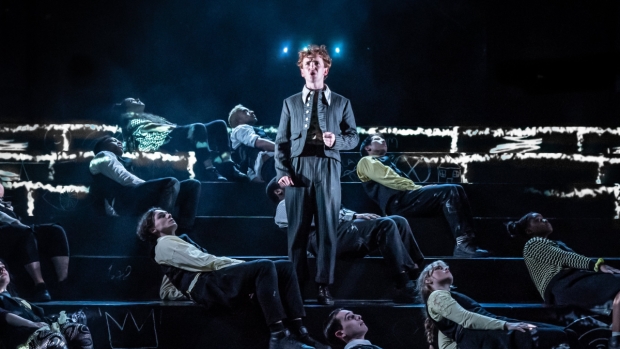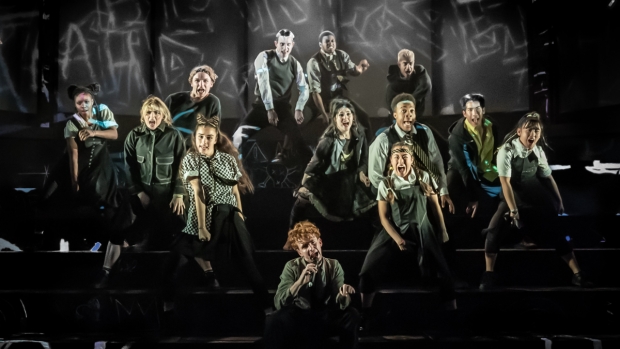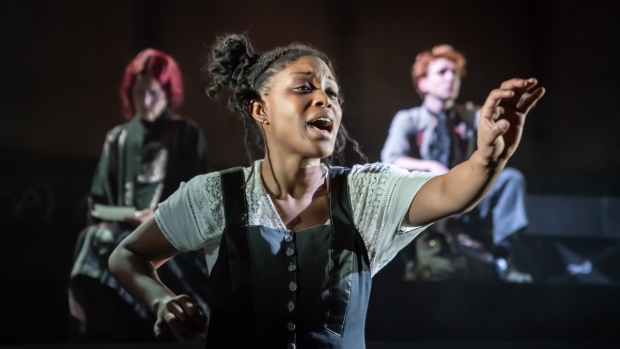Spring Awakening review – a piercing beam of light at the Almeida

© Marc Brenner
The mood is dark in this long-postponed version of Steven Sater and Duncan Sheik's multi-award winning musical about the chaos, confusion and agony of adolescence. But the production is a triumph, a piercing beam of light into the way that the adult world simultaneously ignores and suppresses young people.
It's based on a play written in 1891, and its lurches into melodrama can be blamed on Frank Wedekind's original. But Greta Thunberg – "you have stolen my dreams and my childhood with your empty words" – is quoted in the programme, and the themes of the piece speak with loud contemporary clarity in this virtuosic staging directed by Rupert Goold with force and steely brilliance.
The particular battleground for these Gen X youngsters is sex, and the lack of willingness of their elders – played in a series of chilling cameos by Catherine Cusack and Mark Lockyer – either to explain or to understand their teenage experience. They are innocent and idealistic, finding their way in the world. When the adults in charge brand their natural feelings corrupting and immoral, the dismissal is part of a wider attempt to suppress and undermine the younger generation.

© Marc Brenner
The effects are devastating and the musical – with its punchy and lyrically expressive songs – builds an atmosphere of terrible claustrophobia, which its protagonists only escape occasionally and always at their peril. Miriam Buether provides a vertiginous set of bleachers; up, down and along these narrow ledges, the youngsters attempt to carve a precarious hold on their lives.
Nicky Gillibrand's brilliant costumes – both 19th century and entirely contemporary – Jack Knowles' shadowy lighting and Finn Ross's video designs which seep across the stage, all combine to create a world that is constricted and prescribed. The cast themselves provide the flames of individuality that illuminate the space, sometimes – in a great theatrical moment – shooting up from under the stage, sometimes – in Lynne Page's vivid, fluent choreography – moving with great speed and vigour, as they try to defy the rules of a society that grinds them down.
All of them have a direct, unmediated quality, an affectless way of communication that makes them emerge as fully-fledged characters. They sing terrifically too, voices both sweet and strong, making the most of songs such as the wistful "There Once Was A Pirate" (reinstated from the original workshop production) and the defiant "Totally F**ked", in which the small and effective band under the musical direction of Jo Cichonska sounds enormous.

© Marc Brenner
The weight of the show falls on the shoulders of the three leads: clever Melchior, whose high-minded dreams of a better future are nearly crushed by the consequences of his affair with the naïve but lovely Wendla; and well-meaning Moritz, who is destroyed by the weight of expectations placed upon him. All are utterly superb.
As Melchior, Laurie Kynaston (familiar from The Son and The Ferryman) has a tentative openness, and a firm belief in his own knowledge that make his descent almost unbearable to watch. Amara Okereke as Wendla matches him in tenderness and magnanimous trust; the scene where they make love (staged with the help of intimacy director, Ita O'Brien) has a touching clumsiness that makes it all the more affecting. Her singing is so pure and radiant, it seems to come directly from her heart. The last of the central trio, Stuart Thompson, is simply heart-breaking and there are fine performances too from Nathan Armarkwei-Laryea as one of life's survivors and Carly-Sophia Davies as one of the world's lost souls. It is a triumphant achievement and I wish it a long run and full houses.










